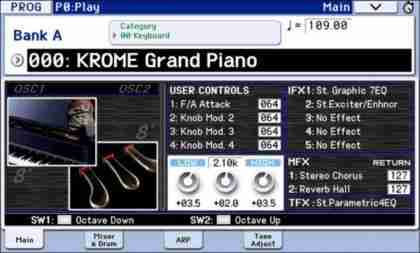September 20,2022
Korg Krome review
by Jennifer Cameron inMediterranean Style
As much as we love the sophistication and big-screen flexibility of computer-based digital audio workstations (DAWs), there are times when you just want to switch on a machine and play without having to boot up a PC, load a DAW and switch on a host of peripherals. You may be pushed for time, for instance, and just want to jump on a keyboard to play an old favourite or quickly jot down some new ideas you had on the train home. Thankfully, the Korg Krome, a music workstation that is the result of many years’ experience and evolution from the iconic Korg M1, lets you do exactly that.
We reviewed the 61-key Krome, but it’s also available in 73- and 88-key versions, and you even buy it in limited edition colours, such as a rather fetching red. The Krome looks very much like a modern version of the M1, which is no bad thing. It has a clean, uncluttered and well laid out control surface that presents controls in symmetrical grid patterns, so you’ll have no problem remembering where controls are or reaching for the next one you need. To the left of the central touchscreen are controls for changing certain items in real time, such as the four encoders that can be used to change the value of effects among other things. There are also buttons to display the Global controls menu on the touchscreen, and buttons to enable a drum track and arpeggiation. To the far left is a joystick that lets you apply LFO and vibrato effects and bend pitch, and it works just like an X/Y pad on an effects unit.

To the right of the touchscreen are controls for navigating menus, selecting the sound presets you want to use and controls for the Krome’s built-in sequencer. The Krome’s headphone output is conveniently located at the front of the keyboard, so it doesn’t trail over controls or the keyboard. It’s a 3.5mm output, so you’ll have no trouble finding headphones to use with the Krome, but we’d have preferred both 3.5mm and 6.3mm outputs at the front.
At the back are two 5-pin DIN MIDI ports for MIDI input and output, a stereo pair of 6.3mm jack audio outputs, three 6.3mm jacks for pedals, a USB port for connecting the Krome to a computer and an SD card slot for storing song and sound data.
The Krome 61’s keys are semi-weighted, and feel good, certainly better than many MIDI controllers we’ve used.
HIGH-QUALITY SOUNDS
As the Krome is a Korg machine, it goes without saying that it’s packed with high-quality sounds, especially the piano and string sounds, which evoke memories of classic rave and house tunes. All the sounds are credible, but those who are heavily into synthesis should consider the more expensive Kronos instead. However, there are some acidic bass sounds, and the arpeggiator and effects can provide some ear-bending results. You can also combine single instruments into one instrument to make truly haunting and spectral sounds, should you wish.
Instruments and sounds are known as programs, and you can select programs easily by typing in a number with the keypad and pressing enter. Alternatively, you can press the name of the program on the touchscreen and select the name of a program from the list shown. You can also choose sound types by category or find a specific program by typing all or part of its name into the touchscreen. The Krome provides you with 640 individual programs over six banks, and 384 combinations (multiple programs that you can combine to play as one instrument). That’s plenty of sounds, and combined with the arpeggiator and some of the Krome’s 193 digital effects you have immense scope for exciting and original programs.

Once you’ve edited and created your own program you can save it to one of 128 user-defined program slots. You can also do the same with combinations of sounds.
